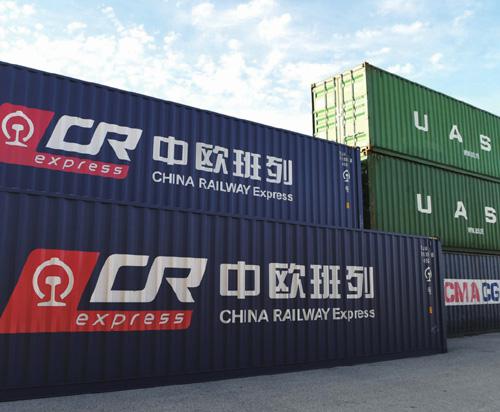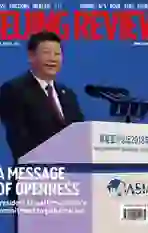Choosing Sides
2018-05-06ByXuXiujun
By Xu Xiujun

On March 22, Donald Trump signed a memorandum, invoking Section 301 of the 1974 Trade Act, announcing U.S. plans to impose tariffs on $60 billion of Chinese imports, lodge a dispute with the World Trade Organization (WTO) over Chinas technology licensing and restrict Chinas investment in strategic industries and technologies.
From March 23, the Trump administration began imposing a 25 percent tariff on imported steel and 10 percent on aluminum imports. At the same time, Trump further exempted the European Union(EU), Australia, Argentina, South Korea, and Brazil, albeit only through May 1, 2018.
It is suspected that Trumps tariffs are intended to launch a trade war against China. Theoretically, there are three possible roles that the EU might play in such a dispute.
Potential scenarios
It is possible that the EU might act as an opponent to the United States tariffs. This would be a hard decision for the EU to take, standing against the United States in the context of the current relationship between the two. Judging from the current countermeasures that the EU is committed to adopting, retaliation is on the cards, but the EU also hopes to reach a compromise in the hope of securing a long-term exemption.
This is also a reflection of the EUs ambivalence when it comes to the United States. However, as one of the worlds most important economies, it remains possible that the EU might act responsibly and take appropriate countermeasures against the U.S. tariffs.
Another potential scenario is that the EU looks to benefit from Sino-U.S. confrontation without getting involved. An economic and trade confrontation between the United States and China can only result in the destruction of both sides. However, countermeasures by either of the two economies would seriously degrade the international economic and trade environment. No economy in the world can emerge from such an outcome unscathed.
As a bystander, the EU would marginalize its position in the world economic and political system and lose its voice on major world affairs. Obviously, this is not something which the politicians of EU countries seek.
It is also possible that the EU will join the U.S. camp and act as an accomplice in seeking to restrict China. Assuming a role as an active ally would consolidate the EUs traditionally close relationship with the United States, but would surely be counterproductive if the cost were an all-out confrontation with China.
China is the EUs second largest trading partner after the United States. According to data from the European Bureau of Statistics, in 2017 Chinas trade with the EU reached 573 billion euros ($704 billion), only 58 billion euros ($71 billion) less than with the United States. Moreover, the continued expansion of the Chinese market offers additional momentum for China-EU trade relations. In 2000, China represented 5.5 percent of the EUs total trade. That proportion had almost tripled by 2007, rising up to 15.3 percent, while China has since become the largest trading partner of major EU member states such as Germany.
There is still great potential for trade cooperation between China and the EU, with much room for improvement in bilateral trade relations. Therefore, opposing China regardless of international rules and morality simply for the benefi t of an historical alliance with the United States would be a risky move for the EU to take.
Benefit analysis
On the one hand, as a guardian of the global system of multilateral trade, the EU has grounds to oppose any attempt by the United States to violate multilateral economic and trade rules. The EU is one of the original architects of current multilateral trade rules and holds an important position within the existing system. At present, all EU countries are WTO members and it is in the interests of the EU and its member states to maintain the status quo of global multilateral trade.
The U.S. Section 301 investigation of China is a unilateral act that is expressly prohibited by Article 23 of the WTO—Understanding on Rules and Procedures Governing the Settlement of Disputes (DSU). According to the WTO ruling and the U.S. commitment, the United States cannot determine whether other members practices violate WTO rules through a unilateral 301 investigation. When dealing with WTO-related matters, the United States must take action in accordance with WTO rules and DSU rulings.
This investigation sets a dangerous precedent. If the world continues to abide this kind of behavior, it will do severe damage to the multilateral system of trade and throw international exchange into disarray. Although the investigation targets China, everybody loses in the end. The EU should therefore stand on the side of justice by strictly opposing and resisting the United States measures which violate the basic spirit and principles of the WTO.
However, primarily acting as the defender of its own interests, the EU will take measures to avoid any harm to its own economy by the new U.S. tariffs.
Although the EU is exempted from the new tariffs for now, this exemption is only valid until May 1 this year. Once it has expired, the EU will again need to apply to the United States to obtain approval before it can continue to enjoy exemption from tariffs.
In other words, when it comes to trade relations with the EU, the United States has a card that can be played in exchange for EU support, although this sort of gamesmanship is unlikely to go down well with the EU. Unless the United States itself makes compromises, the EU has an incentive to oppose the United States measures.
Overall the most likely strategy that the EU will adopt is the implementation of proper countermeasures as circumstances evolve, so as to maintain its favorable position within the global system of trade. Whether motivated by morality or defending its own interests, the EU should not and will not take measures to hand money to those who do not play by the rules.
Even if the EU is unable to introduce strong, active and effective countermeasures to uphold justice against the unilateral acts of the United States, its current proposals and initiatives are a barometer of the international communitys stance on the issue.
In the trade war between China and the United States, the EU must be a dependable partner with whom China can strengthen cooperation.
